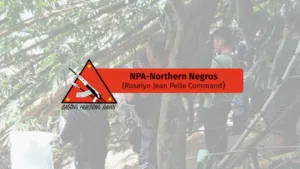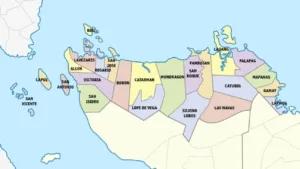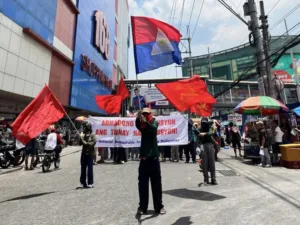Juliet de Lima | Interim Chairperson | Negotiating Panel | National Democratic Front of the Philippines June 02, 2021
On Justice Carpio’s opening statement at the 1Sambayan peace web forum advising that peace agreements must be in accordance with the Constitution (lest it suffer the fate of MOA-AD for being unconstitutional): Give the quotation!
At the outset, while we are pleased and warmly welcome Justice Antonio Carpio’s positive views on the imperative of peace negotiations, we wish to reiterate that the GRP-NDFP Hague Joint Declaration signed on September 1, 1992 constitutes the framework of the GRP-NDFP peace negotiations. It stipulates that the holding of peace negotiations must be in accordance with mutually acceptable principles, including national sovereignty, democracy and social justice and that no precondition whatsoever shall be made to negate the inherent character and purpose of peace negotiations.
In addition, before peace negotiations can be resumed, all the obstacles to these put up by the Duterte government, such as Proclamation No. 360 on November 23, 2017 cancellation of the peace negotiations; Proclamation No. 374 declaring the CPP and NPA as terrorist organizations and the AntiTerrorism Act of 2020 or Republic Act No. 11479, as well as the designations by the Anti-Terrorism Council of the CPP, NPA and individuals of which many are directly involved in the peace negotiations,must be withdrawn, rescinded or repealed, as the case may be. All agreements reached so far in the peace negotiations, most important of all, The Hague Joint Declaration and the Joint Agreement on Safety and Immunity Guarantees, must be affirmed and all detained personnel involved in the peace negotiations must be released.
The Comprehensive Agreement on Respect for Human Rights and International Humanitarian Law must be upheld as a solemn mutual agreement of the GRP and NDFP. This is the first substantive agreement between the two negotiating parties. We must preserve and build on this agreement in order to advance further in the peace negotiations.
In the Hague Joint Declaration, the underlying principles in the negotiations of parity, equality, reciprocity and mutuality in the process, mechanisms, and agreements are entrenched and recognized by both Parties. Its decisive provision is that: “No precondition shall be made to negate the inherent character and purpose of the peace negotiations.” This means that no party, neither the Government of the Republic of the Philippines (GRP) nor the National Democratic Front of the Philippines (NDFP) shall make a precondition insisting that its constitution be the sole determinant of the GRP-NDFP peace negotiations.
If this is allowed, it would mean imposing surrender and capitulation, which would negate the inherent character and purpose of the peace negotiations. Then there would be no real negotiations. It would mean unilaterally imposing surrender particularly on the NDFP.
That is why the Hague Joint Declaration is a necessity for the GRP-NDFP peace negotiations. It is an agreement of parity. It is an agreement of reciprocity. It opens the way to peace negotiations on Social and Economic Reforms, Political and Constitutional Reforms and End of Hostilities and Disposition of Forces.
From the very beginning, the NDFP has rightfully insisted that it has its own constitution. It refuses to recognize the GRP Constitution as the sole determinant of the GRP-NDFP peace negotiations.
The third item in the substantive agenda of the GRP-NDFP peace negotiations on Political and Constitutional Reforms (PCR) and its prospective agreement precisely anticipates potential mechanisms to ensure that all the peace agreements, culminating in the last item on End of Hostilities and Disposition of Forces (EHDF), are compatible with the Parties’ respective legal and judicial processes and frameworks to effectively implement the prospective Comprehensive Agreement on Social and Economic Reforms (CASER) and the Comprehensive Agreement on Political and Constitutional Reforms (CAPCR).
Preconditioning the peace negotiations with the submission or surrender of one side to the Constitution of the other is the prevention of peace negotiations. The peace negotiations should allow the negotiating and still conflicting parties to negotiate and advance in making mutual agreements in terms of principle, policy and practical cooperation towards the goal of a just and lasting peace by addressing the roots of at the armed conflict through social, economic and political reforms.
Both Parties are expected not to impose their respective legal and constitutional process on the other such that they can negotiate to come up with agreements based on such mutually acceptable principles of democracy, social justice and national sovereignty.
In the concrete, either or both Parties should be open to tweak their respective organic documents to make them consistent with whatever is achieved in the negotiating table to give life to the SER and PCR as well as the EHDF provisions so they can be implemented both jointly as well as separately by the Parties.
The logic of the items in the substantive agenda, their sequence, and their operationalization envisions that from one comprehensive agreement to another there is advance of mutually agreed principles, policies and practical cooperation towards a just peace.
As a matter of fact, even under the ongoing CASER drafts, there are multiple proposed provisions on practical cooperation, including projected GRP congressional appropriations for genuine land reform and national industrialization.
At all events, the Parties should and are expected to anticipate, address and hurdle any constitutional and legal concerns or challenges that arise or may arise when they negotiate and enter into agreements. The extensive work done on the Comprehensive Agreement on Social and Economic Reforms ( CASER) by the negotiating panels and their respective reciprocal working committees should not go to waste but be continued.












